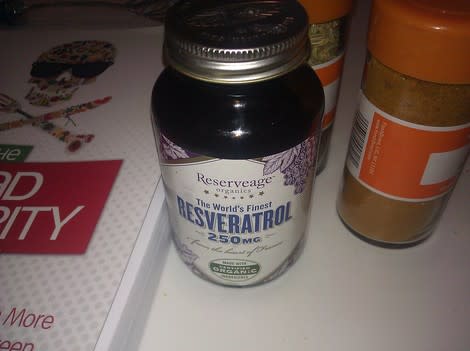Research on Benefits Red Wine Faked? Say it Ain't So

See that? That's my bottle of Resveratrol. I paid $50 for it at a health food store after reading a bunch of 'scientific breakthrough' articles about the anti-aging benefits of resveratrol, an antioxidant derived from red wine grapes. At first I felt some sucker-derived buyer's remorse, but after a couple weeks taking the capsules my hair looked shinier, my skin was slightly less blotchy, even those forehead creases I've spent 33 years anxiously folding started to smooth out. Or so I thought.
Reuters reports today that a doctor who provided longterm research on the link between red wine grapes and anti-aging is being charged with 100 acts of fraud and falsification.
First a little back-story: Dipak Das Ph.d, former director of cardiovascular research at the University of Connecticut, was an early researcher studying resveratrol, a derivative of red wine grapes with the ability to reverse the process of aging on a cellular level. Das and his team weren't the only doctors studying the antioxidant, but his research published in leading medical journals were incorporated into other studies on the ingredient. As the field of red wine research expanded, fountain of youth findings hit the mainstream. Studies suggest aesthetic results are only part of the potential, resveratrol is also linked to cancer prevention and long-term heart health.
These findings were so exciting, not only to me, but to pharmaceutical companies and beauty industry execs, that they jumpstarted a product craze. GlaxoSmithKline invested $720 million in developing a product but dropped their research when the results didn't impress. A Las Vegas brand called Longevinex booked Das as their spokesperson for an "aspirin-like" version of the ingredient. Meanwhile, resveratrol skin, lip and nail products have rolled out conveyer-belt style. If you left the Home Shopping Network on long enough, you were bound to catch someone hawking the Serious Skin Care Resveratrol Kit-four creams promising supple skin rejuvenation.
My bottle of youth pills, found in the vitamin section of my happy hippie market, promises on the label to "activate the longevity gene, provide rapid cell rejuvenation, and offer maximum antioxidant protection." In smaller print, I'm told: "These statements have not been evaluated by the Food and Drug Administration. This product is not intended to diagnose, treat, cure or prevent any disease."
Back in laboratory land, a storm was brewing. In 2008, U.S. Office of Research Integrity notified the university where Das worked, about potential misconduct in his' research. An investigation led to a 500-page breakdown of potential falsified research dating back to 2002. Accusations in the report include "manipulated images [in Das' data]...by means if photo imaging software." That means papers he published in leading medical journals, which provide the basis of research for other studies, may have been based on falsified results, if these accusations prove true. Now the University of Connecticut has ceased funding on Das' research and turned down a $890,000 federal grant he won.
Meanwhile, Das denies the charges and claims he's the target of a racially-motivated conspiracy.
"I became the Devil for the Health Center, and so did all the Indians working for me," he wrote in an official response to the allegations. "The evidence for conspiracy and racial hatred is overwhelming."
An article in Friday's New York Times suggests this whole debacle has less to do with resveratrol research and more to do with the politics of research funding. In fact, a leading expert in the anti-aging ingredient, tells the Times he's hardly familiar with Das' work, and that the credibility of antioxidant won't be compromised because of these accusations. So perhaps the red wine cure for everything still has a chance to save the world.
But where does that leave me and my $50 bottle of Resveratrol? I really thought it was working.
Related:
Resveratrol: the new skincare fountain of youth?
Red wine does a body good
Wine is a natural sunscreen: study
Can red wine prevent cancer?
Wine can make you smarter, says study
